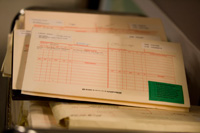Case Issuance & Extradition Division
In 2012, the Case Issuance and Extradition Division was managed by Division Chief Lisa Rodriguez, Assistant Chief Susan Gust, Legal Support Manager Ella Bookwalter, and Paralegal Supervisor Don Morton. The division is comprised of the following units:
 Domestic and International Extraditions Unit
Domestic and International Extraditions Unit- Felony Issuing & Priors Unit
- Lifer Hearing Unit
- DA Liaison Unit
- Realignment and Collaborative Court Unit
Domestic and International Extraditions
The Extraditions Unit is responsible for countywide efforts to return fugitive defendants from other states and foreign countries to San Diego. This unit also works on cases involving fugitives located in San Diego who face extradition to other states.
- Domestic: In 2012, the unit extradited 42 defendants from other states back to San Diego. Extradition prosecutors also handled 192 hearings for the extradition of 52 fugitives from San Diego to other states, citizen identity hearings, as well as other related hearings.
- International: In 2012, the San Diego District Attorney's Extradition Unit successfully extradited three serious and violent offenders from Mexico back to San Diego. Since 2008, the unit has successfully extradited 17 fugitives from Mexico.
High-profile international cases handled by the Extraditions Unit in 2012 Included:
- In March, Mexican authorities extradited Fernando Herrera Salas to stand trial in San Diego County for his alleged role in a gang-related murder. Herrera Salas and other members of the "Center Street Locos" gang allegedly chased the victim down the street, surrounded him, and began punching and kicking him in February 2002. Herrera Salas is charged with pulling out a folding knife during the assault and stabbing the victim multiple times in the chest and arm. The victim collapsed on the porch of a nearby residence, where he died.
- In October, Mexico extradited Jose Ruiz Cortez to San Diego County, where he was wanted in connection with raping a child.
 Felony Issuing & Priors Unit
Felony Issuing & Priors Unit
This unit has the responsibility of carefully reviewing the police reports documenting criminal activity that occurs in the central area of San Diego to determine whether felony charges should be filed. In addition, Case Issuance staff decides if a submitted case should be referred to another prosecution agency or to another division to be handled vertically – by just one Deputy District Attorney for the life of the case. In 2012, the attorneys in this division reviewed 5,580 felony cases for issuing and busy clerical staff processed all of those cases. There were 4,111 felony cases issued; 758 were rejected; and 711 were redirected to other agencies. The division also handled a variety of legal issues and provided legal advice on criminal law, procedure and evidence to various law enforcement agencies that submit cases to our office for review.
The Priors Unit obtains certified court documents for the DA's Office. The prior convictions elevate a defendant's custody exposure so defendants with criminal records are given a more appropriate sentence than those defendants who have no previous criminal convictions.
With the Criminal Justice Realignment Act of 2011, defendants began serving prison sentences in county jail pursuant to Penal Code section 1170(h). Additionally, instead of a return to state prison for revocations for violations of Parole and Post Release Community Supervision (PCS) conditions, these parolees and PCS offenders are ordered to serve up to 180 days in local jail as well. In order to prove prison priors for these offenders, the Priors Unit was instrumental in developing a process with the Sheriff's Department to document local prison priors and revocations for evidentiary use.
CHOP (CODIS Hits Outcome Project)
With a grant from law enforcement, one issuing Deputy District Attorney was assigned to work closely with the San Diego Police Department and Sheriff's Department to resolve cold case DNA hits through the statewide CODIS DNA system. This is an exciting development that combines technology and science to achieve a greater measure of justice for San Diego victims in previously unsolved crimes. To date, as a direct result of this new collaborative project with law enforcement, several felons have been tied to older crimes while they were pending new felony cases.
Lifer Hearing Unit
The DA's Lifer Hearing Unit has two main goals: to ensure that dangerous prisoners with life sentences are not released carelessly and to ensure that crime victims and their families are given an opportunity to participate in the parole hearing process. Last year, the Lifer Hearing Unit processed 298 cases for parole suitability hearings. There were 176 lifer parole hearings, with 47 inmates receiving parole grants from the California Board of Parole Hearings. One hundred twenty-nine inmates were denied parole at their hearings and two of the 47 parole grants were overturned by Governor Brown.
A court ruling in the Lawrence case resulted in the spike in parole grants during the last three months of 2012. However, our county still has a lower grant rate than other counties without a Lifer Unit.
High-Profile Lifer Hearings handled in 2012 included:
- Craig Peyer was denied parole for 15 years in January. In this infamous case from 1986, on-duty CHP Officer Craig Peyer pulled Cara Knott's car over as she was driving home on Interstate 15 and then brutally murdered her.
- Jesus Cecena was denied parole for 3 years in October for the senseless murder of on-duty San Diego Police Officer Archie Buggs during a routine traffic stop in 1978. While Officer Buggs was talking to the driver of the car, Cecena approached him and shot him six times.
- Also in October, Cirese LaBerge was denied parole for three years for her role in murdering a young mother for financial gain in 1994. LaBerge drove while her co-defendant boyfriend shot the mother of his child as she was unstrapping their 18 month old daughter from her child seat. They intended to collect the life insurance policy and raise the child together.
- John Murphy was denied parole for 15 years in November. In 1984, Murphy kidnapped, raped and murdered a young woman. He then drove the victim's car to Shasta where he kidnapped a teenage couple at gunpoint. He sexually abused the female victim and robbed the couple.
DA Liaison Unit
Two very experienced prosecutors are assigned as liaisons to local law enforcement agencies including the San Diego Police Department and the San Diego Sheriff's Department. These prosecutors work closely with law enforcement by assisting with investigations. The liaisons provide critical assistance in assuring evidence is collected lawfully so it can be introduced in court by prosecutors. They also assist police with drafting legal documents such as search warrants, arrest warrants, and other court orders. The DA liaisons are available seven days a week, 24 hours a day to answer legal questions. They are frequently on hand for critical suspect and witness interviews in sensitive and serious cases.
- In 2012, the two liaisons reviewed almost 1,000 search warrants and about 50 arrest warrants. They also provided legal advice on more than 2,000 inquiries from law enforcement and prosecutors.
- Our liaisons also conducted more than 50 law enforcement trainings and classes on topics as varied as search warrants, privileged information, and courtroom testimony for agencies both locally and throughout the state.
Realignment and Collaborative Courts Unit
The Criminal Justice Realignment Act, or AB 109, became operative on October 1, 2011, shifting the supervision, housing and treatment of felony offenders from the state to the county. As a result, not only have new populations of offenders been created but there has been a shift in how the County and the Court address sentencing and re-entry into the community. To provide a uniform and consistent response to this, the Realignment and Collaborative Courts Unit was created.
This Unit provides District Attorney representation on the Behavioral Health Court, the Central and East County Drug Courts and the Parolee Reentry Court. Additionally, this Unit is responsible for handling post release community supervision revocation matters and acting as the office wide liaison with the Probation Department's PRO Unit (Post Release Offender).
This Unit is tasked with participating in the county's implementation of the Criminal Justice Realignment Act and advocating the best solutions to protect public safety. Finally, we provide training in-house, countywide and statewide on all the legal aspects of AB 109 and evidence based practices.

